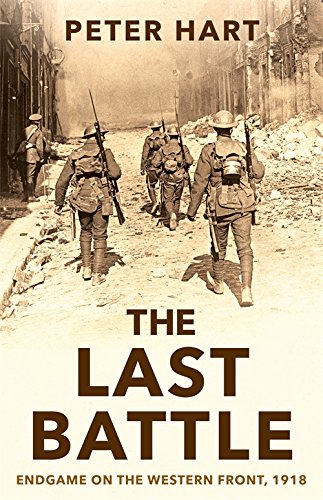The past four years of commemoration of the First World War has been very interesting for a history buff. But, even for me, sometimes the amount of information, “reassessment” and overly earnest TV historians has gotten a bit much. But, some of work produced during this commemoration has been fantastic. The latest of these is Peter Hart’s The Last Battle.
Hart’s book focuses on the final great offensive on the Western Front following the German Spring Offensive of 1918. The German offensive was initially successful, punching into the allied lines using troops freed up from the Eastern Front. By May, however, the momentum had been lost and the Allies were about to prepare their response. 1918 would be very different to the preceding years. In response to the German offensive, Ferdinand Foch was appointed as Commander in Chief of the Allied Forces in France and this meant that the next battles would be fought with a new unity of purpose. By hitting the Germans constantly across the entire front, Foch knew he could get the breakthrough that had been so elusive in the years before and had cost so much in blood and treasure.
Following from Foch’s appointment, Hart looks at the crucial arrival and deployment of the American Expeditionary Force in late 1917 and the steep learning curve they faced as they were thrown into the line. The tactics that had been learnt at great cost by the French and British took time to settle in to the American mindset, but they would learn, even though the cost was high. Hart’s narrative is finely balanced between the macro and micro view of the battles. As each of the battles is described, Hart carefully explains the position of the forces, their readiness and what their objectives were. He then interposes first hand accounts from the men who were there on both sides. This brings a level of focus that can be missing in other books describing huge battles. Hart makes sure we stay with the same voices throughout the battle. While Hart describes the wider course of the battle, we drop in our “eyes” on the ground to be confronted with a battle that we do not expect from the First World War, one of movement, the type of war dreamed of by commanders for years. The contrasts of 1918 with what went before are brought to the for in the chapter on the Fifth Battle of Ypres and the Battle of Courtrai (28th Sept – 2nd Oct 1918) when Brigadier General James Jack of the 28th Brigade, 9th Division notes:
data-animation-override>
“The day’s success has been astonishing: an advance of over 5 miles – more than in four months’ bloody fighting last year.”
The first hand accounts are fascinating. From the veterans astonished by the advance deep into “the green fields beyond” which they had dreamed of for years, to the wide eyed eagerness of the Americans turning into the realisation of what modern warfare is. There is a matter of fact element to some of the accounts that is equally remarkable and heartbreaking. Listening to men about to throw themselves into a wall of steel for the umpteenth time with the resignation and professionalism that they did it with is mind boggling. Where The Last Battle pays those men, on all sides, such a great tribute is that Hart lets their voice be front and centre. Hart shows us where they were and then hands the narrative over to them. It is a tricky thing to get right and Hart pulls it off as brilliantly.
The myth that the German Army was not defeated on the West Front is completely debunked in The Last Battle. That the war ended when did, by the stroke of a pen, is the only thing that stopped the charge east of the Allied armies.
The Last Battle is a masterful narrative history. Few authors are able to ensure that the reader is not lost in the massive scope of operations they are describing, here Hart manages it perfectly. Throughout, Hart gives credit to the Empire forces (Australia, New Zealand and Canada) and the zeal at which they took to their role as the point of the spear. He also pays superb tribute to the Belgians who were fighting to liberate their homeland and the French who paid an astonishing price in blood to push their foes from their soil. The number of French dead is unfathomable and one we tend to forget from an Anglo perspective. Yet, Hart does make a comment about the “regrettable habit of Canadian historians in ascribing every military innovation of the Great War to the Canadians, and the Canadians alone…”. While Hart does highlight the Canadian Corps “success in battle”, it is a disservice to his colleagues who, while rightly looking through a Maple Leaf lens, are also up against a British historian element that attributes Colonial forces, especially in popular history writing and TV, very little outside of events such as Gallipoli or simply calling them “British forces”. This gripe is a small, personal one and should not overly distract from what is a superb book.
Peter Hart has written a superior history of those fateful, remarkable final few months of The Great War. Hart brings a personal level to the narrative that brings heart to huge numbers of dead and wounded we can find ourselves glossing over when we read all those zeroes. The first hand accounts from all sides are a treasure to read and bring the personal to the unimaginable. Peter Hart’s work is superb and a fitting tribute to those who fought The Last Battle.
The Last Battle by Peter Hart is out now from Profile Books.


